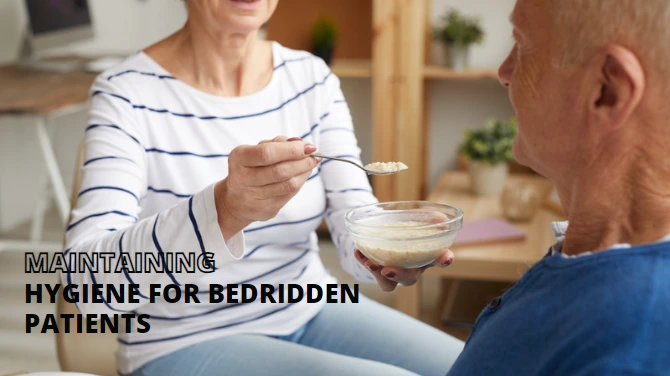- June 01, 2023
- Bedridden patients
Maintaining hygiene for bedridden patients

Bedridden patients require special attention when it comes to maintaining hygiene. Being immobile, they are more prone to infections and skin problems. Hygiene is essential for bedridden patients to prevent the spread of infections and to promote their overall well-being. In this blog, we will discuss the various aspects of maintaining hygiene for bedridden patients.
Bathing
Bathing is essential for bedridden patients to maintain personal hygiene. Bathing helps to remove sweat, dirt, and dead skin cells, which can cause skin irritation and infections. However, it is not always possible to bathe bedridden patients in the traditional way. In such cases, sponge baths are recommended.
Sponge baths involve using a basin of warm water, soap, and a washcloth to clean the patient's body. It is important to use mild soap and warm water to avoid irritating the patient's skin. It is also important to dry the patient's skin thoroughly to prevent the growth of bacteria.
Oral hygiene
Oral hygiene is another important aspect of maintaining hygiene for bedridden patients. Poor oral hygiene can lead to tooth decay, gum disease, and bad breath. It can also increase the risk of respiratory infections.
Brushing the teeth twice a day is recommended for bedridden patients. If the patient is unable to brush their teeth, a soft-bristled toothbrush or sponge can be used to clean their teeth and gums. Mouthwash can also be used to freshen the breath and kill bacteria.
Hair and nail care
Hair and nail care are also essential for maintaining hygiene for bedridden patients. Hair should be washed at least once a week to prevent the buildup of oil and dirt. If the patient is unable to wash their hair, dry shampoo or a damp washcloth can be used to clean the hair.
Nail care is also important to prevent the growth of bacteria and fungus. Nails should be trimmed regularly, and the cuticles should be pushed back gently. It is important to avoid cutting the nails too short, as this can cause ingrown nails and infection.
Incontinence care
Incontinence is a common problem among bedridden patients. It is important to maintain proper incontinence care to prevent skin irritation and infection. Incontinence products such as diapers and pads should be changed regularly to prevent the buildup of bacteria and odor.
It is important to clean the patient's skin thoroughly after changing the incontinence product. A gentle cleanser and warm water should be used to clean the skin. It is also important to apply a barrier cream to prevent skin irritation and breakdown.
Bedding and clothing
Bedding and clothing should be changed regularly to maintain hygiene for bedridden patients. Bedding should be changed at least once a week, or more often if it becomes soiled. Clothing should be changed daily to prevent the buildup of sweat and bacteria.
It is important to use clean, soft bedding and clothing to prevent skin irritation. Bedding and clothing should be washed in hot water with a mild detergent to kill bacteria and germs.
Maintaining hygiene for bedridden patients is essential for their overall health and well-being. Bathing, oral hygiene, hair and nail care, incontinence care, and bedding and clothing care are all important aspects of maintaining hygiene for bedridden patients. By following these guidelines, caregivers can ensure that bedridden patients stay clean, comfortable, and healthy.





